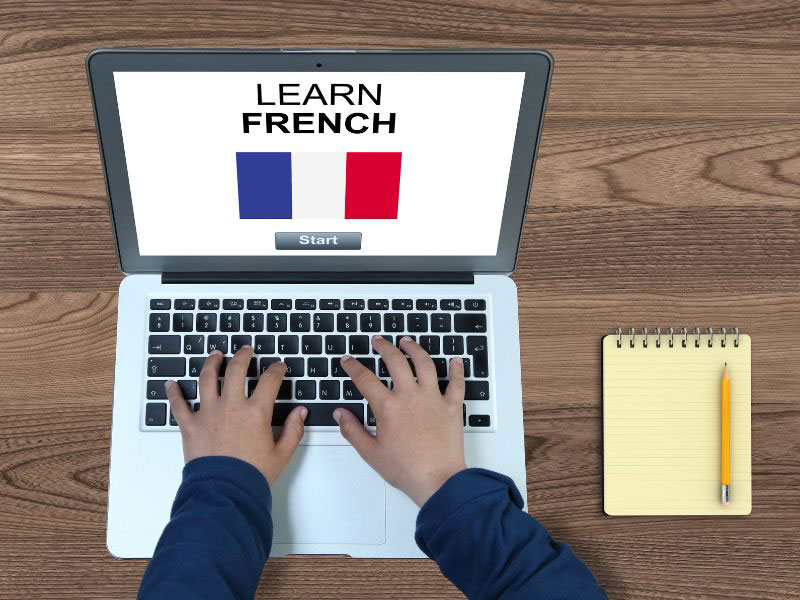Idioms, or idiomatic expressions, words and phrases that aren’t meant to be taken literally often have a cultural meaning behind them. They exist in all languages and are often part of everyday language and conversation! They don’t really make sense when you read each word separately, but they have an implied meaning. We asked Manon de Witte who teaches French lessons online at French Coffee Break, to share some of the most commonly used idioms in French, some key phrases that French people use daily, and which will help you to sound French – and speak like a local.
Avoir un coup de foudre
Literally: to have a thunderbolt
No, it’s not a meteorological catastrophe, but a feeling. Like lightning, which is a sudden, instantaneous phenomenon, this expression means “falling in love at first sight”, instantly.
Romantic, isn’t it?
As an example of how you might use it in French “Quand Thomas a vu Julie, il a su qu’elle était la femme de sa vie. Ça a été le coup de foudre.” When Thomas saw Julie, he knew that she was the woman for him. It was love at first sight.”
Avoir un coup de barre
Literally: to have a blow or knock from a bar
There are a lot of expressions with the word “coup”. Here, literally, a blow from a bar would be a bit violent. But to the French, everyone knows that it figuratively means “avoir un coup de barre” means to be suddenly tired, to feel an unexpected fatigue.
As an example, you could say “Je prends toujours un café quand j’ai un coup de barre.” I always have a coffee when I suddenly come over all exhausted.
The word coup features a lot in idioms, for instance coup de mou – feeling sluggish
Poireauter
We all know a “leek” is a green vegetable. But the verb “poireauter” or sometimes we say “faire le poireau” (“to do the leek”) has nothing to do with the vegetable. It means “to wait” (informally), usually due to a delay.
For example, “J’avais rendez-vous avec Antoine mais il était en retard. J’ai poireauté pendant une heure dans le froid !” I had a meeting with Antoine, but he was late. I had to wait for an hour in the cold!
Sécher les cours
Literally: to dry classes
No, you don’t literally “dry” classes with a hair dryer. This expression means you are deliberately missing classes, you are not attending classes voluntarily.
Example: “Le directeur du lycée m’a appelé ce matin car mon fils était absent en cours de maths ce matin. Quelle surprise, c’est la première fois qu’il sèche les cours !” The principal at the school called me in this morning because my son was absent from maths class this morning. What a surprise – it’s the first time he’s missed a class.
Faire la grasse matinée (ou la grasse mat’)
Literally: to do the fat morning
You know that sweet pleasure of waking up peacefully on a Sunday morning at 11am without an alarm… Well, if you do, you have already done a “grasse matinée” (= to sleep late).
Example: “Mon fils de 15 ans fait toujours la grasse matinée, le dimanche il ne se réveille pas avant 11 heures ou midi !” My 15-year-old son always sleeps in late, on Sundays he never wakes up until 11 am or even mid-day!
Avoir du piston / Être pistonné(e)
“Être pistonné(e)” is not, as literally translated, to have a piston. It is in fact a way to get a job, an internship, a promotion, a favor…because you know someone who recommends you, when you have connections and someone’s recommendation to get an advantage.
Example: “Ce n’est pas juste, mon collègue a eu une promotion alors qu’il travaille moins que moi… Je suis sûr qu’il est pistonné ! Son père connaît le patron.” It’s not fair, my colleague has been promoted even though he doesn’t work as hard as me – I’m sure he got the job through favouritism. His dad knows the boss.
Chercher midi à quatorze heures
Literally: to look for noon at 2pm
As with many idiomatic expressions, this one has no real literal meaning, but it is still widely used by French speakers. “Chercher midi à quatorze heures” means needlessly choosing the complicated option, looking for complications when there are none.
Ne cherche pas midi à quatorze heures : pour les vacances, réserve un hôtel avec le petit-déjeuner inclus et tu seras tranquille !
Être au bout du rouleau
Literally: to be at the end of the roll
A roll is composed of sheets, of paper for example. When you have arrived at the last sheet, you are literally at the “end of the roll”. Figuratively speaking, this means (familiarly) that you are exhausted, discouraged, have no energy left. You have reached the limit of your capabilities… Let’s hope you don’t have to use this expression!
Example: Les médecins et les infirmiers font beaucoup d’efforts depuis le début de la pandémie de Covid-19… Ils sont au bout du rouleau. Je comprends pourquoi ils font grève. The doctors and nurses made huge efforts since the start of the pandemic of Covid 19 – they have no energy left. I understand why they are going on strike.
Avoir la chair de poule
Literally: to have gooseflesh
“Avoir la chaire de poule” means goosebumps or goose pimples.
Example: “Je ne peux pas écouter Jacques Brel sans avoir la chair de poule.” I can never listen to Jacques Brel without getting goosebumps.
Casser les pieds de quelqu’un
Literally: to break someone’s feet
To break someone’s feet is to annoy, bother, or strongly irritate that person. If you are disturbed, annoyed by someone, you can say they are “breaking your feet” – it’s an informal expression).
Example: Ma voisine me casse les pieds tous les soirs avec le volume de sa télé ! My neighbour is driving me nuts with her television turned up so loud.
The expression gave birth to the adjective “casse-pieds” (annoying). Être casse-pieds = casser les pieds
Ma collègue Sandra est casse-pieds, elle arrive toujours en retard en réunion ! My colleague Sandra is so annoying, she’s always late for our get togethers!
Using phrases like this that native French speakers use daily, improves your French language skills!
You can hear Manon pronounce these phrases here on YouTube
If you want to learn French – join Manon’s French Coffee Break classes, group or individual online tuition for all levels that really works. Use the code NEW20 to get 20% off your first course.










